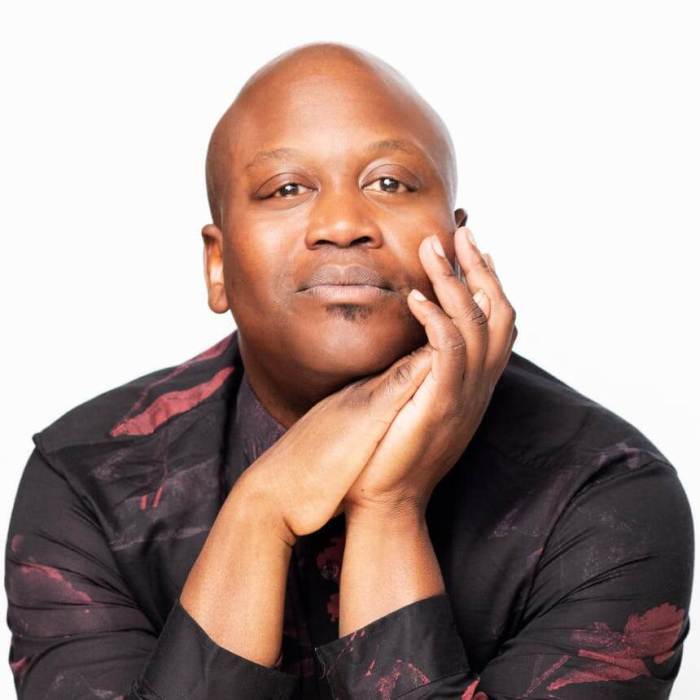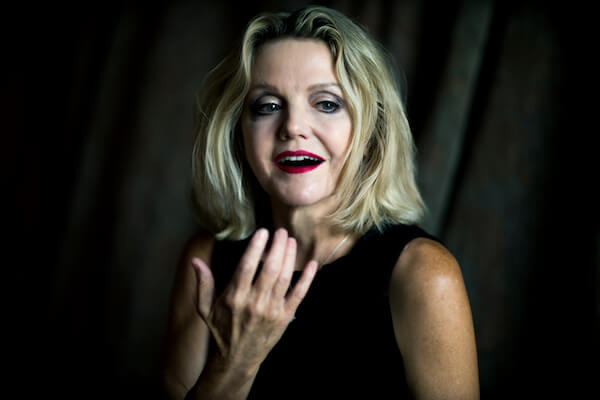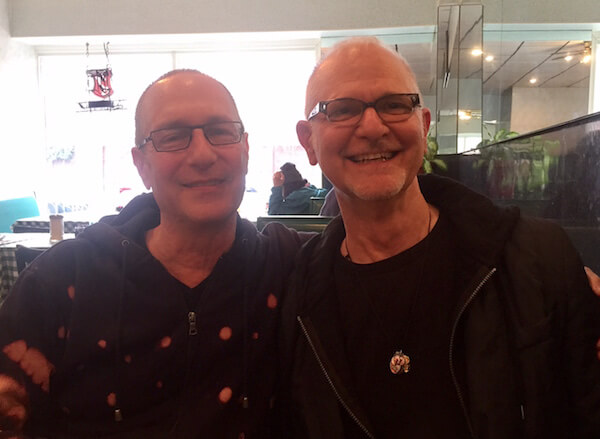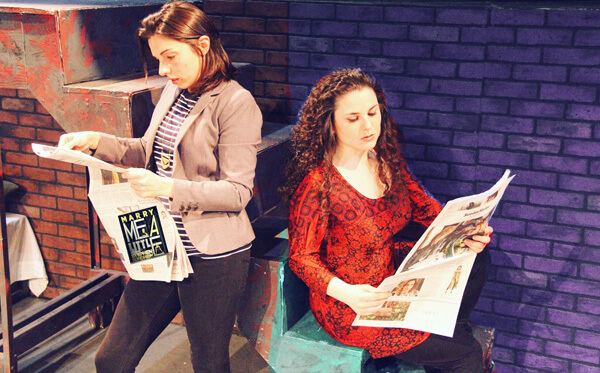Deborah Voight appears at the 92nd Street Y with her one-won show, “Voigt Lessons,” on February 26. | 92Y.ORG
Deborah Voigt, having survived weight gain, drastic loss, addiction, one marriage, a few toxic relationships, and the most recent, gargantuanly tricky Wagner Ring Cycle revival at the Met, is ready to take it easy now. She has a one-woman show, “Voigt Lessons,” coming up at the 92nd Street Y (February 26; 92y.org), as well as a memoir, “Call Me Debbie: True Confessions of a Down to Earth Diva,” a must-read for its riveting honesty about the isolation and insecurity as well as the glory that come with stardom.
The seeds for “Voigt Lessons” began with a conversation she had with director Francesca Zambello about recitals and how to build opera audiences with them. Zambello suggested she do a one-woman show with the help of writer Terrence McNally.
“We got a grant from the MacDowell Colony and went there for a little over a week,” Voigt said. “Terrence and I spent the first three days alone, and I had been carrying around a list of songs I liked, from a Carpenters piece to a Brahms lied to an aria. We came up with this show, ‘Voigt Lessons,’ and he was able to weave my story around these songs. We did a reading for our fellow colonists, then a couple of performances at Glimmerglass and Boston, and will finally do it in New York. I’ve been trapped in opera land, Wagner and Strauss land, not having the chance for a giggle or to show a lighter side of my personality. So this gives me that opportunity and, also to share some of my more difficult struggles in my life.”
An opera diva and a Broadway diva review their lives in book and song
Voigt certainly shares in her memoir, which is full of startling, soul-baring revelations concerning her obsessions with food, alcohol, and the wrong kind of men, as well some very juicy backstage diva dish. Sitting in the audience you sometimes wonder about the emotional state of the star you’re watching onstage. How much is acting and how much of it turbulent reality? Voigt provides answers that are sometimes distressing, sometimes humorous, but always searingly honest. Renee Fleming is often dubbed the “people’s diva,” and though I did not mention her by name, I told Voigt that with her own earthiness, approachability, and oft-discussed weight problems, she was far more deserving of that appellation.
“Well, thank you,” she responded with a chuckle. “Very much appreciated. I think it’s important to let the people define you in that way, and coming up with your own definition in that respect is probably not the best way to go. That’s why I loved Beverly Sills, who certainly deserved that title but never proclaimed herself that way. We certainly weren’t friends, but the first time I ever saw her, she was on a farewell tour in Orange County at the Crystal Cathedral, a cavernous place. I got a ticket and knew nothing about her, but I was just struck by her voice, which even at that point was phenomenal. And she had this very real rapport with the audience, very much in her own skin, and I never forgot that. And when I later had the opportunity to meet her, that’s what she was: no airs or artificiality about her or accent picked up over the Atlantic Ocean, really refreshing. I think somehow I filed that away subconsciously in my little book of diva behavior.
“I started the idea for this book many years ago, after my experience with the Royal Opera House [where in 2004 she was fired for being overweight] and losing weight, which was a story in People magazine. Then I thought about it and felt it was just not the right time. I knew that Brunhilde [in the Ring Cycle] was looming and I would have more to say artistically once that mountain was climbed. And looking back at it on a personal level, I realized there were certain issues that were starting to rear their ugly heads and I think that someone or thing up there was saying, ‘Okay, this is not the time: you have things you have to achieve and deal with before you can write an honest book about your life not only on, but offstage.”
Voigt acknowledged that her food and alcohol addictions were very real, but took pains to clarify that what some have pounced on as a so-called sexual addiction is, in fact, “people interpreting as an addiction what was more a latent adolescent blooming in my mid-30s more than an addiction. But, that being said, it was certainly in that time of my life another way to avoid feeling and being with myself. It did anesthetize some feeling, so for a period of six to eight months I was very distracted in my time off stage.
“There’s not a woman in the world who doesn’t want to feel attraction to and from the opposite sex, and I’d never experienced that. I just started putting on weight by the end of high school, and it went up from there. So when I found myself single, slimmer, and high on [diet drug] fen-phen, it was open hunting season. It’s very hard for anybody to meet that special person that really synchs up with them, but it is particularly challenging in my line of work. A lot of the people I run into are gay, of course, or married, so you gotta catch them when they’re freshly divorced.
“Then there’s that whole opera diva perception: can I approach her? How can I knock on her dressing room and ask her to have coffee? If that happened, I would faint dead away. Whatever your addiction is, it’s all in balancing things, a challenge. I’m dieting again and I’m jonesing for sugar. I’m holding out because yesterday I had a photo shoot here, so I had coffee and a big box of Danishes for the people. My assistant is always trying to lose weight, and I said, ‘I know I should send that box out to those people, but I don’t want to,’ and she said, ‘I’m not telling you what to do but you know what you should do. And I handed it over and out it went, and I satisfied myself with a health bar. But on my tour I’m going to Boston and apparently the most world famous Boston cream pie is made there so I’m holding out. I just hope I make it that long. Somehow, I don’t think I will.
At one point Voigt weighed 333 pounds, “my heaviest, and that’s when I went to gastric bypass. When I look at old pictures, it’s hard to believe that’s me and I decided to take it off just before it really became a problem. I always moved well, but when I began to feel winded just walking around the block… My mother had serious orthopedic problems and I was starting to have them, and still have them, from all that weight, plus genetics plus all the raked stages I’ve performed on. When I get to the Pearly Gates, I’m going to ask the Lord, “One, why do we have to age the way we do? [ Laughs.] Two, why doesn’t broccoli taste like Boston cream pie? And, three, where was that dream man in my life? But I’m less concerned with that than I am with the Boston cream pie.”
As for the alcohol, “I am in a 12-step program and I do something for my recovery every day, whether it be reading, praying, whatever that is, but it’s a daily decision and choice. No one but you has ever asked me if I ever went onstage drunk, but, no I never did. I never drank on the day of a performance, but the minute I was done and I got home, yes. You’re always alone in a hotel or your apartment, and toward the end, after a performance, the bottle was already open before I left and I’d take a swig of wine before I took my coat off.”
Having survived, among other things, Robert Wilson’s controversial, roundly booed “Lohengrin,” in which she barely moved, and then Robert LePage’s controversial Ring Cycle, in which movement could be treacherous due to that huge temperamental machine of a set that was employed, Voigt calls opera “a blood sport. The whole experience of singing Brunhilde was so daunting, just taking on that role at the Met, and the drama with Jimmy [Levine] there and then Jimmy gone. It was difficult, no question, and I think the Machine took a worse rap than she should have. She was temperamental, no question about it, but I loved watching it from the house. Yet I wouldn’t be honest if I didn’t say I was careful about every step I took when I was on it. But Bryn Terfel and James Edgar Morris went across that thing like it was no problem, so it was just me perhaps.”
Marin Mazzie is at 54 Below through February 7. | 54BELOW.COM
Every bit as bracingly real as Voigt is her Broadway diva counterpart Marin Mazzie, about to appear at 54 Below (through February 7; 54below.com). She loves her new show, describing it as “so much fun! ‘Come on to My House,’ ‘Make Your Own Kind of Music’ — it’s a show that focuses on the songs that influenced me early in my life, growing up in Rockford, Illinois, from when I was 10 to my high school years. My parents loved music. There were a lotta albums in my house, with all these ‘60s and ‘70s pop tunes no one’s ever heard me sing except me, with my purple hairbrush for a mic in my bedroom. It’s the Partridge Family, the Monkees, Carly Simon, Crosby, Stills & Nash, Burt Bacharach.
“For people around our age these songs really do spark great memories, defining a time or event in your life. The Columbia Record Club, or your transistor or clock radio that you listened to in a simpler time when there were only three TV channels as opposed to now, where we have everything 24 hours a day and anyone can make a video of themselves and put it on the Internet.”
Mazzie, one of those kids who always sang and was doing theatricals from age eight, laments the closing of her show “Bullets Over Broadway”: “I loved it and I’m sad and perplexed that it’s gone [laughs]. I was a huge fan of the movie, and it was fun to take on the part of Helen, so iconic with Dianne Wiest, whom I loved in it. [Director Susan] Stroman was very open to my interpretation of her, and Woody [Allen] was there at every preview. Not that much during rehearsals, he didn’t need to be. He would come when we had something to show him, and during previews every day he would come in with a new joke for someone and do it for them. You’d think, ‘Will I get a Woody Allen joke?’ and then ‘How do I say it?,’ because no one delivers a Woody Allen joke better than him.”
Mazzie adored her glittering William Ivey Long wardrobe, loved the 1920s period, and said they’d often be jumping up and down during their collaboration with pure excitement. The role of Helen was particularly coveted and there were rumors of just about every major Broadway diva being considered for it: “That was sort of funny. I was doing the workshop of it while all this stuff was being talked about, and they just weren’t ready to announce the casting. They sort of waited, just one of those things of how they were going to roll it out. I don’t really pay any attention to that stuff because it really doesn’t have anything to do with me. I’m just trying to do my work — creating, that’s the most important thing to me. I try to stay away from all that stuff. It can get into your head or something, and that’s what I don’t want to ever happen.”
This attitude seems typical of Mazzie, who has always seemed one of the most reliably sane and professional people in the biz. She’s been married to actor and singer Jason Danieley since 1997, and I asked if her happy home life had much to do with her grounded demeanor: “That’s definitely part of who I am. Yes, Jason and I are very definitely on the same wavelength as far as all that goes, because this business is crazy, unpredictable with its ups and downs. It’s very important to us to focus on our work and selves, staying healthy and being artists and creating. We thought about having kids, but it was all about the timing of when we met and how old I was when we got married. It wasn’t in the cards for us, which was our choice, a good one for us. We have Oscar, our dog who is our child, and I really didn’t feel like I needed to add to the surplus population… horrifying phrase.”
A total Sondheim devotee, Mazzie was in the revival of “Merrily We Roll Along” 30 years ago (“I was two”), and vividly remembers her audition for James Lapine and Sondheim, her knees shaking. After she sang “Not a Day Goes By,” “Lapine said it was great, but Steve came down and said, ‘That was good, but you sang “And there’s hell to pay,” but it’s “So there’s hell to pay.”’ I slunk offstage, but I did get the job and that was my first lesson. Not that I didn’t think lyrics were important, but that’s what’s amazing about a Sondheim song, the difference between an ‘and’ and a ‘so.’”
Asked if there was yet one role Mazzie still longs to do, she said, “There’s one I’m hovering around, but I don’t wanna put it out there yet. It’s in my head, certain people know, but there’s a lot to come. The road is open.”
Telling Mazzie that hers was the most scorchingly definitive rendition of “Bewitched,” from “Pal Joey,” I’d ever heard, I asked her where the hell she was when they cast the last revival of it.
“Just be patient,” she replied.



































